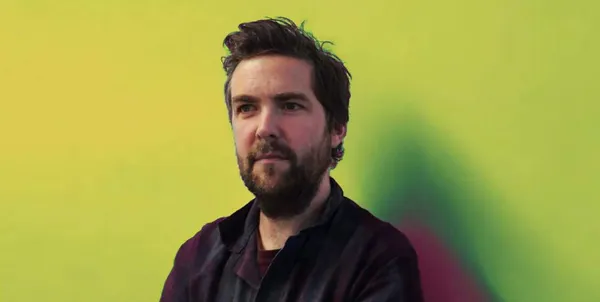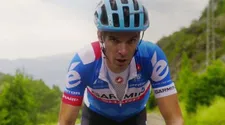 |
| Finlay Pretsell Photo: Cycling Films Ltd |
When I first read about Finlay Pretsell’s documentary Time Trial, which screened at the 2018 Edinburgh International Film Festival, I wasn’t expecting to find it very interesting. Although we aim to be neutral, every film critic has their own personal preferences, and taking on a new subject is difficult, especially if the film doesn’t communicate it very well. I knew nothing about cyclist David Millar and relatively little about his sport, but the film turned out to be quite unlike what I had anticipated. Furthermore, when I spoke to director Finlay Pretsell, he seemed pleased that I’d covered it as an outsider.
“It’s really good, the reaction from people who have no interest in or no knowledge of cycling,” he told me. “One of the big things we wanted to get over was to translate that experience on screen for people who know nothing about cycling.”
 |
| David Millar Photo: Rachel Stollery |
So how did he come to make it?
“I’ve followed David forever and been a fan of cycling. He’s one of the only bike riders racing in the Tour de France, which is the biggest race in the world, and I think I already had this inbuilt knowledge. I made a short film, many years ago, called Standing Start, about a velodrome track cyclist who was a contemporary of Chris Hoy, and I sent it to David with a view to making this film. This was probably 11 years ago. So this film has been gestating for many years.
“I said to him ‘I’d love to meet. I’d love to potentially make a film with you about a road race.’ So that was how it happened. We met at a bike fundraising meal and we ended up staying up all night just talking about how we could potentially do this film. He really wanted to do it, and I think that’s the biggest things when you’re making documentaries, especially something that’s not straight down the line conventional. They have to be on board, they have to understand what you’re trying to capture. David was so engaged and up for being a part of it and going that distance, which was a bonus really, you know? He gave me full trust throughout the time of this incredibly complex film to make.”
It’s an incredibly raw and intimate film and David puts a lot into it emotionally. Was Finlay concerned about how the process of making it might affect him?
“Yeah. I mean, he’s pretty robust... I think what he enjoys about the film is that it captures a truth which other films have certainly not done in the cycling world. It captured that vulnerability. this passing moment – his time has passed. I was really concerned about how he was going to feel about it actually, and I thought the master interview was tough, but he got up the next day and he was like ‘Well, I think that would have been some good stuff from last night!’ Which was a relief to me because he could understand what it was about and what it meant.
 |
| Riding in the rain in Time Trial Photo: Rachel Stollery |
“I was always worried about that and I still am, but it’s also the reason why I like him because he would allow you in and it was just like what happened and he was like ‘Well, the film’s going to be what it’s going to be.’”
It’s a film that talks about a lot more than just his personal experience.
“Yeah. That was the big goal of it. It was never going to be about his story – we always talked about that from the start. We never wanted this biographical portrait of a hero and I think it’s kind of been done to death. And it’s not he truth of what happened and how many of these sportsmen just drift away. There’s not a dramatic ending or a wonderful swansong.”
So was the long delay in making the film happen an advantage in the end, in that it meant they ended up filming at a pivotal point in David’s career? Were they fortunate?
“Yeah. I think we were. I think we got really lucky in that – without giving the ending away – we were incredibly lucky to get that ending... I could never see a way to make the film without him coming to the end of his career somehow. I think this time allowed us to really explore what bike racing is all about, and experiment with all these camera techniques to give this different feeling and texture that was required.”
There’s such a lot of experimental work in the film that there must have been a lot that didn’t work out as intended...
 |
| Riding with the pack in Time Trial Photo: Rachel Stollery |
“There’s so much unusable stuff that would make you feel absolutely sick watching it, and I love that stuff. For me that stuff really feels like you’re in a race, in a chaotic world. I love that. We must have shot maybe 600 hours in the end. There was so much beautiful stuff that we couldn’t put in without completely isolating an audience.”
Does he race himself?
“No. Well. I did many years ago, maybe 10, no, no, about 15 years ago I raced, back in the day. Nothing like David’s level but I did a lot of mountain biking, road racing, at British level... Interestingly, everyone else in the crew had no interest in cycling, and they still don’t. That was kind of important to me because I can easily get seduced by some of the aspects of bike racing and also ignore some of the more interesting aspects, so I think that combination of having people who knew nothing about it, who would recognise something or see something that I wouldn’t see or I would have said ‘Ah, that’s just not that interesting,’ when it actually is. But having said that, the kind of mundanity of what they do also was really surprising to me. I had no idea that they [the race participants] would just be having these chats about holidays and that sort of thing. The rage and the fury of all these guys when someone breaks off the front and they’re all groaning, I didn’t think that would happen. I thought that only happened in amateur racing.
“So yes, all my experience was hugely in there. And I feel like the film’s been going on for as long as I’ve had an interest in cycling, which is, like, since I was 12. I think that film’s been in the back of my head for so long.”
So it has his history in it too..?
 |
| David Millar remembers Photo: Rachel Stollery |
“Oh yeah, yeah. Absolutely. The funny thing is, I’ve grown up watching David, you know? And I’ve been so impressed by somebody making it like that. Making such a go of the sport. He’s superhuman, really. And I think the way he looks on a bike is so elegant and graceful – there’s not many people that look like that.”
I noted that I’ve met a lot of people who watch the Tour de France for the scenery, and that something I like about his film is the way it set all that aside and found much more intense material in mundane landscapes and close-ups from the riders’ point of view.
“When you watch the Tour de France on television you’re completely removed from the action and the chaos, but also, the riders never see the landscapes go past or the nice chateau on the hill – they don’t see any of that. They’re so focused on what they’re doing all the time that they purely see hotel rooms, airports and bike wheels, you know? I always set out to make this kind of claustrophobic, very close up view of the race and the racers.”
One of the scenes that stood out to me comes late on in the film, when David is cycling in a tight pack and there’s so much rain on the lens – and, presumably, on his glasses – that it’s impossible to see what’s where in the tangle of vehicles ahead. That’s scary.
“Of course. That is what it’s like. Any bike rider watching the film, which a few pro cyclists have in the past, they’ll agree that this is exactly what it’s like. You can’t see anything. You’ll be getting al the road rain and dirt off the road coming into your face. With your glasses on or off, it’s always really complicated. So I think that’s the truth, that.
“What I loved about these little cameras we used was the shitty looking, gritty, aggressive digital line that they have. It’s quite old school. It just gives another impression of what it feels like to be in that rainy chaos. They were really great little cameras!”
 |
| Getting up to speed Photo: Rachel Stollery |
All this innovation meant that he needed a cinematographer he knew he could rely on.
“I worked tirelessly with Martin Radich, the cinematographer. That was an endless process of me and him talking and working things out, and we took some risks with the format we shot it on, and I think some of that stuff works and some of it doesn’t. We kind of egged each other on to do that. It was a fantastic collaboration. I don’t think I could have done it with anyone else.”
They worked together previously on dysfunctional family drama Norfolk.
“Yeah, Norfolk and that first short film that i was talking about earlier, and a film that I made called Cutting Loose, which is a hairdressing film that happens in Scottish prisons. So we had a very close relationship really. I think it was all about that talking and talking things out and then saying ‘Right, let’s go with this.’”
Some of the camerawork in this film reminded me of Norfolk, too.
“Oh yeah, yeah. Because Martin was the director of Norfolk and I was the producer and Martin was also the cinematographer, so there was a lot of crossover in a way.”
So how does he feel now that Time Trial is about to go on general release?
“I’m kind of nervous about it. Because I think any sports people or big fans of David, I don’t know how they’ll react to it. I’m concerned about that. Because if people have a very strong impression of David, this gives a different view of him, this film. It’s very different from his persona as an interviewee or writing books or anything like that. It gives a much more kind of sensitive, tender portrait. And I think the film’s almost not about him. This is what both David and I like and feel is really successful: it becomes about something other than him. It’s about this strange world rather than David Millar the man.”
I suspect the fans will be intrigued. Viewers who normally avoid sports films would also be well advised to catch this one – it’s a powerful piece of work.
























